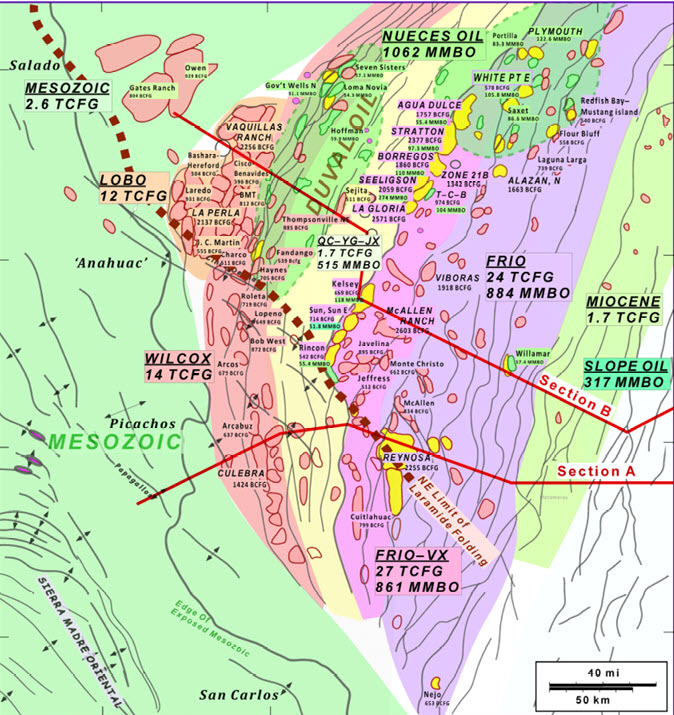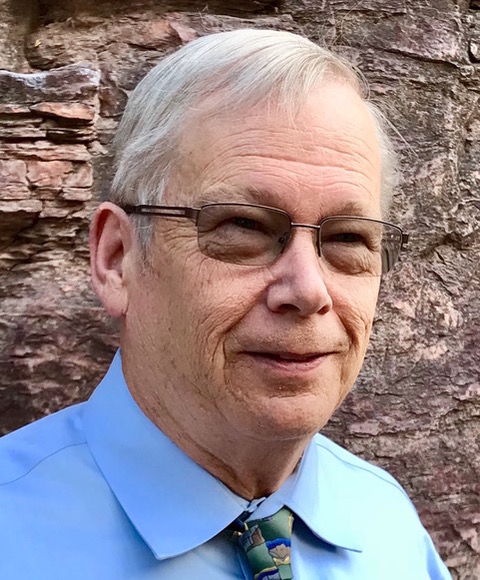HGS Luncheon: Tectonics of South Texas and Mexico
In order to register, please click login to either sign in to an existing account or create a user profile. Go to the HGS home page and login with your user name and password and then return to this page in order to register as a member or guest of a member. For help registering contact the HGS office or email webmaster@hgs.org. Thank you!
HGS Zoom Luncheon
Wednesday, May 22, 12:00 PM Noon to 1:10 PM
Virtual Meeting Online
Tectonic Setting and Petroleum Systems of the Seno Mexicano (South Texas and Northeastern Mexico): An Initial Synthesis
Luncheon Speaker: Dr. Tom Ewing, Senior Geologist, Frontera Exploration Consultants
Seno Mexicano (South Texas and the Burgos Basin of Mexico) is a prolific Cenozoic gas-rich hydrocarbon province, as shown by a fresh compilation and estimation of production. The Texas part of the basin (RRC-4) has produced an estimated 107 trillion cubic feet of gas (Tcfg) and 3,604 million barrels of oil (MMbo) between 1920 and 2000; 76% of the gas and 76% of the oil has come from major fields greater than 50 Bcfg or 10 MMbo (casinghead gas and condensate not included). The Mexican part (Burgos Basin) has produced 16 Tcfg (12.3 Tcfg in major fields), about 15% of total production.
The 183,000 km2 Seno Mexicano basin (99,000 km2 onshore) overlies poorly known, highly extended continental crust related to the Jurassic formation of the Gulf of Mexico. Salt was likely deposited across much of the basin, but few onshore salt diapirs are known. The area lay east of the Jurassic and Cretaceous shelf margins, accumulating 1500-3000 m of limestone, clay, and organic deposits in deep-water environments.
Regional eastward tilting began by the Paleocene, forming the Lobo gravity slide and rafting Mesozoic sediments eastward above Jurassic salt, forming the deep Rosita and Premont troughs and intervening Mesteña raft. Compensatory compression (fold or thrust belt) must occur downdip in the Coastal Zone near the present shoreline, perhaps pushing salt into the Bravo salt diapir. Laramide folding on northwest-southeast axes affected the southern part of the basin in the Middle Eocene.
Subsequent Oligocene to Miocene tilting induced the Vicksburg slide (Early Oligocene), progradation of major deltaic units, and the consequent deflation of the long, broad Bravo diapir, extrusion of the Sigsbee canopy and compression in the Perdido and Port Isabel foldbelts (Late Oligocene-Early Miocene). Continued Neogene tilting onshore created a pronounced sub-Goliad unconformity (Late Miocene) and uplifted the Bordas Escarpment (post-Miocene to Recent).

Production from major fields occurs in four major Cenozoic gas trends and three oil trends: the Lobo trend (Paleocene, 12.3 Tcfg, dry gas); the Wilcox Fault Zone (FZ) trend (Lower-Middle Eocene, 13.7 Tcfg, dry gas); the Vicksburg FZ trend (Oligocene, 27.4 Tcfg with condensate; plus oil rims for 861 MMbo); the Frio FZ trend (Upper Oligocene, 24.0 Tcfg with slight condensate); the Duval oil trend reservoirs (Upper Eocene, 516 MMbo); the Nueces oil area (Oligocene, 1062 MMbo); and the deep-water Perdido oil trend (Eocene, 317 MMbo through 2019). Within each trend, plays may be defined by stratigraphic intervals and trap styles.
The Seno Mexicano contains two world-class Mesozoic oil and gas source rock intervals (Upper Jurassic and mid-Cretaceous); source rocks also are likely to occur in the Paleocene-Eocene slope/basin sediments. The Mesozoic source rocks have been deeply buried and are overmature at present. The nearly dry gas in the Lobo and Wilcox trends was probably sourced from the Eagle Ford as it passed through the gas window, perhaps enhanced by gas from the thick Eocene fill of the Rosita Trough. Gas-condensate of the Vicksburg and Frio reservoirs (Vicksburg FZ and Frio FZ trends) and oil in the Nueces area, however, must have been primarily sourced from Paleogene (probably Eocene) strata of the inner Coastal Zone. Oils in the Duval trend are gas-poor and degraded, but indicate a downdip marine Eocene source in or just below the oil window. The lack of major Miocene production suggests absence of source rock in the outer Coastal Zone and the Bravo trough, where Eocene rocks are probably not present.
About the Speaker: Tom Ewing

Dr. Thomas Ewing is a geoscientist with over forty-three years of experience in hydrocarbon exploration and research. He is a Registered Professional Geoscientist in the State of Texas (#1320) and the State of Louisiana (#468) and an AAPG/DPA Certified Petroleum Geologist (#4538) and holds certification #1610 from SIPES. He can be contacted at tewing@fronteraexploration.com.
Tom received a B.A. in Geology from Colorado College (1975), an M.S. in Geochemistry from New Mexico Institute of Mining and Technology (1977). Ewing earned a Ph.D. in Geological Sciences from the University of British Columbia in 1981.
Dr. Ewing was a research geologist for four years at the Texas Bureau of Economic Geology in Austin, where he served as a co-author of the Atlas of Texas Oil Reservoirs, and compiled the Tectonic Map of Texas. Since 1985 he has been an owner of Frontera Exploration Consultants, Inc., a San Antonio-based geoscience consulting company. He worked with Venus Oil and Venus Exploration from 1985 to 2005 as a staff consultant and Senior Explorationist, playing a main role in its successful exploration in the Yegua Trend of the Gulf Coast Basin and elsewhere in Texas.
Ewing has served in many offices in AAPG and its Divisions, He served as Vice-President for Sections of AAPG (2012-14). He received Honorary Membership in the South Texas Geological Society in 2009, Honorary Membership in the GCAGS in 2010, AAPG Distinguished Service Award, and BEG Alumnus of the Year in 2011. Most recently he has completed service as President of the GCAGS (2016-2017). In 2018 he was awarded the "Don Boyd Medal for Excellence in Gulf Coast Geology" from the GCAGS (Gulf Coast Association of Geological Societies), their highest award. In 2021 he received Honorary Membership in AAPG, and in 2023 the Berg Research Award from AAPG. In 2023 he also received the Monroe Cheney Science Award from the Southwest Section of AAPG. The 2024 GeoGulf Transactions was dedicated to him.
Tom Ewing has spoken extensively at local, regional, and national geological meetings and published over 100 papers and abstracts. Among other awards, he has received the AAPG Levorsen Award three times, twice in Gulf Coast Section and once in Southwest Section. He has written articles on Gulf Coast geology and hydrocarbons, the geology and tectonics of Texas, and history and urban geology of the San Antonio area. He wrote the popular guidebook "Landscapes, Water and Man: Geology and Man in the San Antonio Area" published by the South Texas Geological Society in 2008. In 2016, Dr. Ewing completed Texas Through Time, an illustrated book and website on the geologic history and earth resources of Texas published by the Bureau of Economic Geology. Subsequently, he has authored chapters on the tectonic evolution of the Permian Basin (Ruppel volume; BEG) and on the geological development of the Gulf of Mexico Basin (Miall volume, with W.E. Galloway; Elsevier).
In his spare time, he directs a 30-voice German men's chorus, the San Antonio Liederkranz, and a 20-voice womens' chorus, the Beethoven Damenchor.
| Fees | |
| HGS Member | $ 25.00 |
| HGS Non-Member | $ 40.00 |
| Student | $ 15.00 |
| Emeritus | $ 15.00 |
|
Speaker Info
|
|
Event Contact
|
|
Committee
|
|
Event Filter Informations
|


